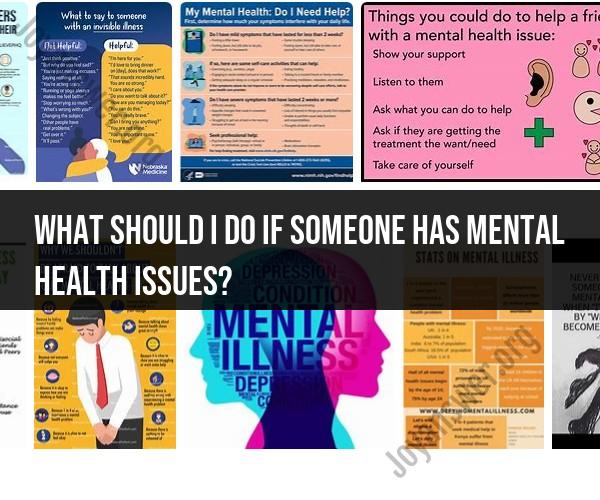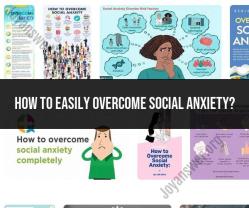What should I do if someone has mental health issues?
Supporting someone with mental health issues requires compassion, patience, and understanding. Here are some guidelines for providing care and support to someone facing mental health challenges:
Educate Yourself: Take the time to learn about the specific mental health condition the person is facing. Understanding their experiences and the nature of their condition can help you provide more effective support.
Listen Actively: Be a good listener. Allow the person to express their feelings and thoughts without judgment. Avoid offering solutions or advice unless they ask for it.
Be Empathetic: Show empathy and validate their feelings. Let them know that their emotions are valid and that you care about their well-being.
Respect Their Privacy: Respect their privacy and boundaries. Don't push them to share more than they are comfortable with. Let them take the lead in terms of disclosure.
Offer Non-Judgmental Support: Avoid making negative or judgmental comments about their mental health. Instead, provide encouragement and reassurance.
Encourage Professional Help: Gently encourage them to seek professional help if they haven't already. Offer to assist in finding a therapist, counselor, or psychiatrist and offer to accompany them to appointments if they're comfortable with it.
Assist with Practical Matters: Help with practical tasks as needed, such as finding resources, managing appointments, or assisting with daily responsibilities.
Stay Connected: Continue to stay in touch and maintain regular contact. Loneliness and isolation can exacerbate mental health issues, so being a consistent presence in their life is valuable.
Offer Supportive Activities: Encourage activities that promote mental well-being, such as physical exercise, meditation, or creative hobbies. Offer to participate in these activities together.
Be Patient: Recovery from mental health issues can be a slow process with ups and downs. Be patient and understanding, and don't expect immediate improvement.
Crisis Planning: If the person is in crisis or at risk of harming themselves or others, take immediate action to ensure their safety. Call emergency services or a crisis hotline if necessary.
Self-Care: Remember to prioritize your own well-being. Supporting someone with mental health issues can be emotionally taxing, so make sure you're taking care of yourself as well.
Communicate Openly: Encourage open communication about their treatment plan and progress. Ask how you can best support them and be willing to adjust your approach based on their needs.
Offer Reassurance: Remind them that you are there for them and that they are not alone in their journey toward recovery.
Reduce Stigma: Challenge and help reduce the stigma surrounding mental health. Encourage open conversations about mental health within your community and among friends and family.
Seek Support: Don't hesitate to seek guidance and support for yourself as well. Join a support group for caregivers or consult with mental health professionals to gain insight into how best to support your loved one.
Remember that providing support to someone with mental health issues can be challenging, and it's essential to maintain boundaries and seek help when needed. Your presence and care can have a significant positive impact on their journey to recovery.
The titles you have provided highlight the importance of supporting loved ones with mental health issues.
Supporting Loved Ones with Mental Health Issues: What You Can Do
This title emphasizes the need for people with loved ones who have mental health issues to be supportive and understanding. Some ways to support loved ones with mental health issues include:
- Educate yourself about mental illness: The more you know about mental illness, the better equipped you will be to support your loved one.
- Be a good listener: Let your loved one know that you are there for them and that you are willing to listen to them without judgment.
- Offer practical help: Your loved one may need help with everyday tasks such as cooking, cleaning, or running errands. Offer to help them with these tasks so that they can focus on their mental health.
- Encourage your loved one to seek professional help: If your loved one is struggling, encourage them to seek professional help from a therapist or psychiatrist.
- Take care of yourself: It is important to take care of yourself when you are supporting a loved one with a mental health issue. Make sure to get enough sleep, eat a healthy diet, and exercise regularly.
How to Help Someone Struggling with Mental Health Challenges
This title highlights the importance of being specific about how you can help someone who is struggling with mental health challenges. Some specific ways to help someone with mental health challenges include:
- Help them to develop a coping plan: A coping plan is a written document that outlines the strategies that someone will use to manage their symptoms and stress. You can help them to develop a coping plan by brainstorming different strategies and writing them down.
- Encourage them to stick to their treatment plan: If your loved one is taking medication or seeing a therapist, encourage them to stick to their treatment plan. This will help them to manage their symptoms and improve their mental health.
- Be there for them: Let your loved one know that you are there for them and that you care. Spend time with them, listen to them, and offer your support.
Offering Compassion and Assistance to Those Facing Mental Health Concerns
This title emphasizes the importance of compassion and understanding when supporting someone with mental health concerns. It is important to remember that mental illness is a real and serious condition, and that people with mental illness should be treated with respect and dignity.
Here are some additional tips for offering compassion and assistance to those facing mental health concerns:
- Avoid judgment and criticism: People with mental illness often feel ashamed and isolated. Avoid judging or criticizing them, as this will only make them feel worse.
- Offer hope and encouragement: Let your loved one know that there is hope for recovery. Encourage them to seek professional help and to never give up on themselves.
- Be patient: Recovery from mental illness takes time. Don't get discouraged if your loved one doesn't see results immediately. Just keep being supportive and patient.
It is important to remember that you are not alone. There are many resources available to help you support loved ones with mental health issues. If you need help, please reach out to a mental health professional, a support group, or a trusted friend or family member.













